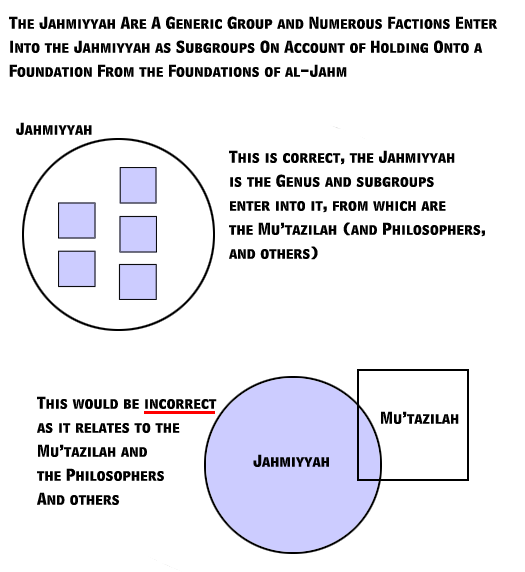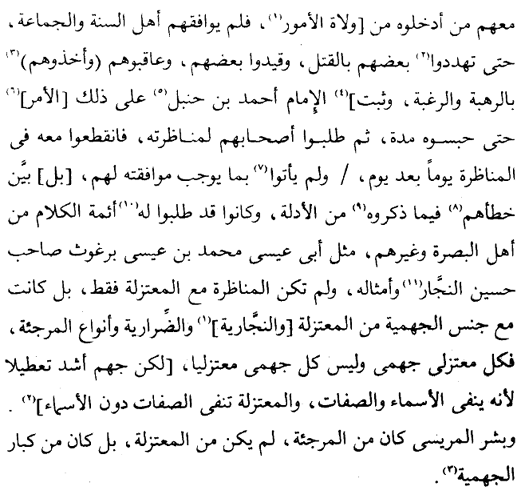
Sunday, December 05 2010 - by Abu.Iyaad
Read more articles at Aqidah.Com

The Answer
This is a very good and important question, and has associated with it lots of benefits. As for the answer, then every Mu'tazilee is a Jahmee, but not every Jahmee is a Mu'tazilee. Upon this principle, the Mu'tazilah, in their entirety, as a group are amongst the various groups who enter into the genus of the Jahmiyyah, and the Jahmiyyah is an umbrella term.

In the first diagram, the circle represents the Jahmiyyah and many factions enter into it. They became Jahmiyyah as a result of adopting one of the usool of al-Jahm bin Safwaan. And the Mu'tazilah became Jahmiyyah. Imaam Ahmad referred to them and labelled them as Jahmiyyah and his debates were with numerous factions who had different innovations, those who were Mu'tazilah and those who were Murji'ah, and he labelled all of them as Jahmiyyah. It is a mistaken notion that he debated "Jahmiyyah". Rather he debated factions from all backgrounds, and those who instigated this fitnah would encourage the figureheads of 'ilm al-kalaam from all backgrounds or persuasions to come and debate him. Imaam Ahmad labelled all of them as Jahmiyyah.
Shaykh al-Islaam bin Taymiyyah said in Minhaj al-Sunnah (tahqiq Muhammad Rashid Salim, 1986, 2/603-604):

So Ahl al-Sunnah wal-Jamaa'ah did not agree with them [those inviting to Tajahhum in negating the attributes] and they were threatened, some of them with death, and others were arrested, punished and taken, with the use of instilling fear, apprehension. Imaam Ahmad bin Hanbal remained firm upon that matter [of the Qur'an and the attributes] until they imprisoned him for a period. Then they requested their associates to debate him, yet they were cut off (in debate) with him, day after day, and they never brought anything that obligated his agreeement with them. Rather, he made clear their mistake in what they mentioned of evidences. And they had requested the leading scholars of kalaam, from the people of Basrah and others, such as Eesaa Muhammad bin Eesaa Burghuth, the associate of Husayn al-Najjaar and his likes. And the debate was not only with the Mu'tazilah alone. Rather, it was with the genus of the Jahmiyyah, from the Mu'tazilah and Najjaariyyah and Diraariyyah, and the various factions of the Murji'ah. For every Mu'tazilee is a Jahmee but not every Jahmee is a Mu'tazilee, however Jahm is the most severe in ta'teel (divestment) because he negated the names and attributes, and the Mu'tazilah negate the attributes and not the names. And Bishr al-Mareesee was from the Murji'ah, he was not from the Mu'tazilah, rather he was from the senior ones amongst the Jahmiyyah.
So this is an explicit text from Ibn Taymiyyah that every Mu'tazilee is a Jahmee, so whoever claimed other than that from Ibn Taymiyyah has erred upon Ibn Taymiyyah and has not grasped his sayings. Thus, factions can be Jahmiyyah on account of a saying, even if they differ with each other on other sayings and what unites them is something from the usool of al-Jahm bin Safwaan and the first Jahmiyyah.
As for the statements referred to in Majmu' al-Fataawa (12/522) wherein Ibn Taymiyyah makes a statement such as:
And the Jahmiyyah - from amongst the Mu'tazilah and others [and also] And the Jahmiyyah - from amongst the Mu'tazilah, the Philosophers and others...
Then these are very clear, because we already established from Ibn Taymiyyah that the Jahmiyyah are many different factions, even the Philosophers are Jahmiyyah. In these types of statements, he does not mean "The Jahmiyyah amongst the Mu'tazilah", this is a clear reversal of his words, he means "And the Jahmiyyah - under which come the likes of the Mu'tazilah groups and others", because the Jahmiyyah are a genus, a general group, and what enters a faction amongst the Jahmiyyah is a saying amongst the sayings of al-Jahm, except that Tajahhum has degrees and levels, some of it is more severe than others. So the Tajahhum of al-Jahm is more severe than the Tajahhum of the Mu'tazilah. And amongst the Mu'tazilah there are factions, some of their Tajahhum is more severe than that of others. But they are all Jahmiyyah.
The Salaf said "Whoever denied there is a Lord above the Throne is a Jahmee." This means what it says. Whoever denied there is a Lord above the Throne is a Jahmee, irrespective of his other beliefs, and the Salaf did not mean, "He only has a view amongst the views of the Jahmiyyah and not all the views of the Jahmiyyah and therefore is not a Jahmee" rather they meant what they actually said, anyone who denied there is a Lord above the Throne, is a Jahmite - see their statements here. We also see Ibn Battah (d. 377H), in his book, which is part of al-Ibaanah al-Kubraa, "al-Radd alal-Jahmiyyayh", he is actually refuting the Mu'tazilah, and he says therein that the Jahmiyyah are sunoof (various factions), and then he lists all their various sayings, and likewise the Shafi'i scholar Abu al-Husayn al-Malatiyy (d. 387H) in his book al-Tanbih wal-Radd alaa Ahl al-Ahwaa wal-Bida' divides them into eight factions and mentions all their sayings, even though his list is not comprehensive.
Conclusion and Summary
The Mu'tazilah are the Jahmiyyah, and "Jahmiyyah" is a generic label which includes a variety of factions, and they enter into this label if they adopt and speak with the something from the usool of al-Jahm, and their also degrees and variations in Tajahhum, from severe, to light. Further, it is not necessitated that when a person is referred to as a "Jahmee" or is said to have something of the usool of the Jahmites, that he is necessarily a kaafir. In a modern context, the level of knowledge amongst people has diminished, and the average person needs to be taught and educated. However, there are callers [posing as Ash'arites] who call to Tajahhum and upon whom the hujjah needs to be established, and most of these people are not ignorant and stupid, they actually understand what they are doing.
Related Articles:
- Are All the Mu'tazilah Considered to be Jahmiyyah and Labelled as Jahmiyyah?
https://www.aqidah.com/creed/?kgsfl
- The First Deniers of Allaah's Speech: A Chain of Evil Narrators
https://www.aqidah.com/creed/?xiyvh